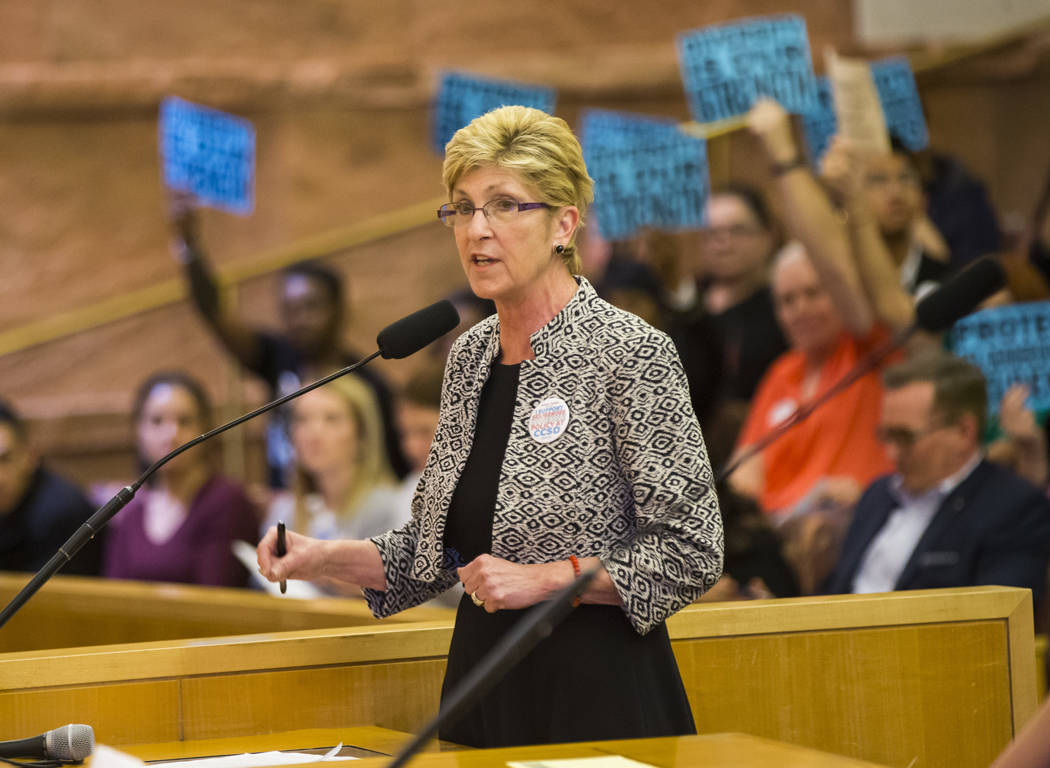NY political group hopes support for Giunchigliani pays off
A progressive powerhouse in New York politics thinks Nevada is ready to move left.
The Working Families Party, comprising influential labor leaders and progressive activists in the northeastern United States, thinks that move starts with getting Clark County Commissioner Chris Giunchigliani into the Nevada governor’s mansion in November.
Giunchigliani is facing off in the Democratic primary against fellow commissioner Steve Sisolak, a candidate with a hefty war chest who began his campaign last summer by touting himself as a moderate.
The WFP has a recent history of challenging and upending more moderate incumbent Democrats in legislative primaries in New York, Connecticut and even Oregon. The group, known for its powerful and coordinated ground games, has also been instrumental in bringing policy issues such as a $15 minimum wage and government-mandated paid sick leave to the top of the national Democratic Party agenda.
“My platform, I think, mirrors what they’ve been talking about,” Giunchigliani said. “I want to build a Nevada that works for everyone and not just the privileged few, and I think that resonates with them.”
Dan Cantor, the national committee chairman for the WFP, said the group chose to endorse the Giunchigliani after an hourlong phone interview with her last month from which he and the other committee members came away with the same thought:
“What is it about Nevada that is producing a leader like this? We want to bottle it,” he said.
Gerald Benjamin, a longtime professor of political science at State University of New York at New Paltz, said the endorsement in the Silver State seems like a “nascent effort to use the Working Families Party to organize the left in national politics.”
The political dynamics in New York, where the WFP got its start in the 1990s, are quite different from those in Nevada.
There, the WFP is considered a minor or third party. But unlike in most other places, third parties in New York can carry serious weight.
There, minor parties can appear on the ballots and even cross-endorse candidates, meaning that a candidate’s name could appear multiple times on the ballot in the same race but with a different party endorsement next to their name. In 2012, for example, Barack Obama appeared on the New York ballot next to the Democratic endorsement. Three lines down, his name was listed next to the WFP endorsement.
The effect, Benjamin said, is that minor parties can mount significant challenges to the establishment parties.
For example, New York Gov. Andrew Cuomo, a Democrat, last week got himself a primary opponent in Cynthia Nixon, the actress known best for her role as Miranda in the HBO series “Sex and the City.” If Nixon can manage to get the WFP’s endorsement, Benjamin said, “the governor has a real problem.”
In Nevada, however, where the minor parties have historically had less influence, Benjamin isn’t sure what kind of measurable effect its endorsement will have.
So the question remains whether the WFP can have the same kind of influence among progressive voters in Nevada that it has built its reputation on in New York.
“They can bring influence; people carry petitions, knock on doors,” Benjamin said. “But if their influence is not measurable, it’s hard to tell.”
Contact Colton Lochhead at clochhead@reviewjournal.com or 702-383-4638. Follow @ColtonLochhead on Twitter.
























